人教版英语八年级下册英语 第一单元学案
- 格式:doc
- 大小:111.00 KB
- 文档页数:6

《Unit 1 What's the matter》学案【学习目标】1.识记并准确运用身体部位的词汇。
2.学会询问他人身体健康状况。
【前置自学】翻译下列单词和短语怎么了__________________; 感冒了 _______________; 背酸痛 ______________;胃痛,肚子痛 ___________________; 喉咙痛 _______________________。
【学习过程】独学:浏览Page1上1a部分,借助单词表完成1a。
对学与群学:1.师生讨论结果并朗读1a单词。
2.积极参与识别身体部位词汇的游戏。
3.浏览Page1上1b要求及所给名称,弄清要求及准确掌握5个名字的发音。
4.弄清1-5几个人所在位置。
5.听录音并按要求完成1b。
6.查阅字典或者资料完成下列词组:咳嗽 ____________________; 打喷嚏___________________;发烧 _______________________;展示提升:1c,两人一组编造对话(注意要有表演)。
【课堂练习】一、写出下列表身体部位疼痛的词汇。
For example: head headachetooth _____________; stomach ______________;back ________ __________; throat _______ ______;back _______ __________; neck _________ __________;二、根据首字母提示及句意填写单词。
1. What's the m________with you?2. We hear with our e________and see with our e________.3. He usually goes to school on f________.4. I have a t__________, so I want to see a dentist.【总结反思】【课题】 Unit1 What’s the matter? SectionA 2a-2d (2)【学习目标】1.更熟悉对身体健康状况的询问及回答。
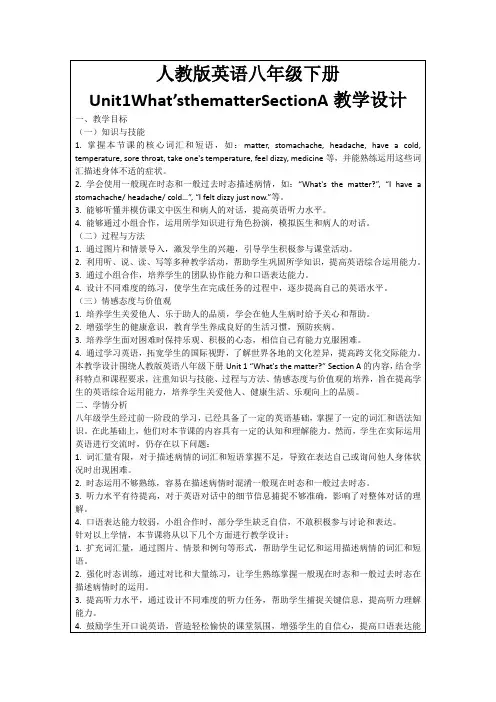
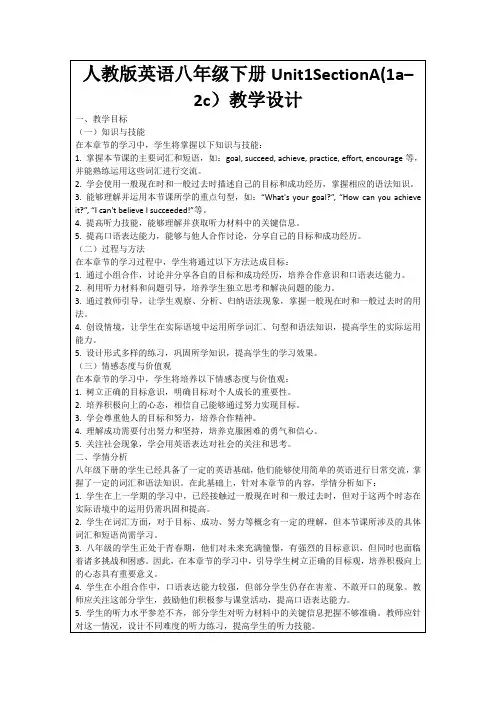
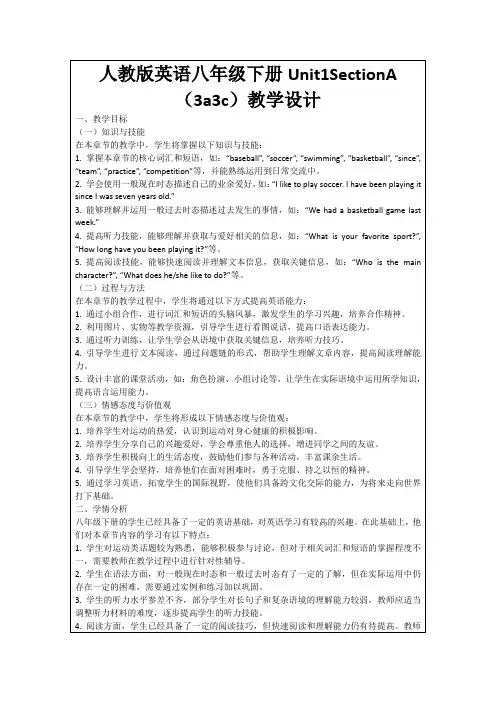
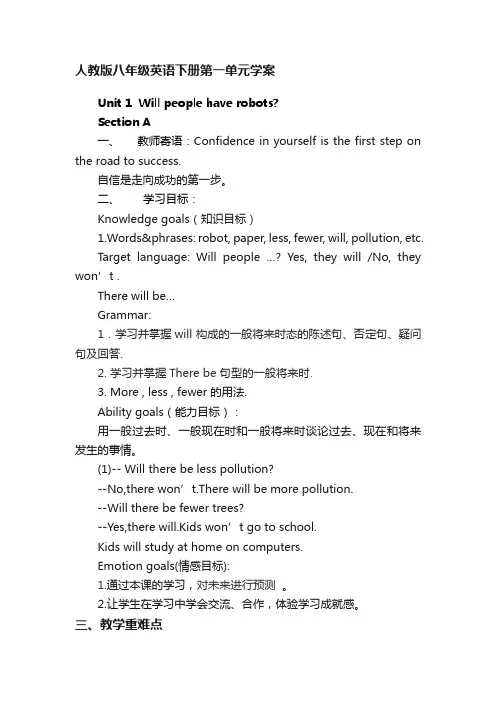
人教版八年级英语下册第一单元学案Unit 1 Will people have robots?Section A一、教师寄语:Confidence in yourself is the first step on the road to success.自信是走向成功的第一步。
二、学习目标:Knowledge goals(知识目标)1.Words&phrases: robot, paper, less, fewer, will, pollution, etc.Target language: Will people …? Yes, they will /No, they won’t .There will be…Grammar:1.学习并掌握will 构成的一般将来时态的陈述句、否定句、疑问句及回答.2. 学习并掌握There be 句型的一般将来时.3. More , less , fewer 的用法.Ability goals(能力目标):用一般过去时、一般现在时和一般将来时谈论过去、现在和将来发生的事情。
(1)-- Will there be less pollution?--No,there won’t.There will be more pollution.--Will there be fewer trees?--Yes,there will.Kids won’t go to school.Kids will study at home on computers.Emotion goals(情感目标):1.通过本课的学习,对未来进行预测。
2.让学生在学习中学会交流、合作,体验学习成就感。
三、教学重难点◆重点由will构成的一般将来时态的句式。
◆难点 1.more,less,fewer的用法。
2.there be 句式的一般将来时态there will be…四、学习过程1、预习导学及自测A.英汉互译1.污染_________2.空闲时间______________3.oncomputers___________4.study at home______5.in 100 years____________6. be free_________B.用more,less,fewer填空:1.There will be ________________(更多的建筑)in 50 years.2.The students will have _______________(更少的家庭作业)to do.3.There will be ________________(更少的污染)here.4.Kids will have ________________(更少的计算机)in their classroom.5.There will be ________________(更多的图书馆)in this city.6.There will be ________________(更少的树)in the park.2、语法小结:一般将来时1)一般将来时由“助动词will+动词原形”构成,表示将来某个时间要发生的动作或存在的状态,常与表示将来的时间状语连用,如:tomorrow,next week,next year,in the future等。
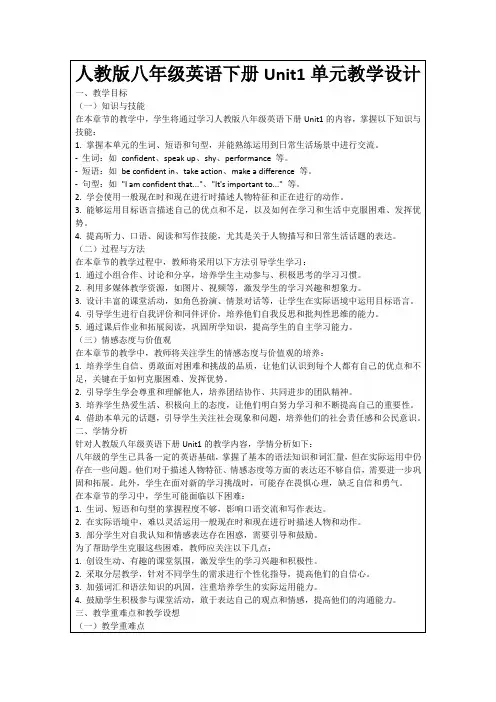
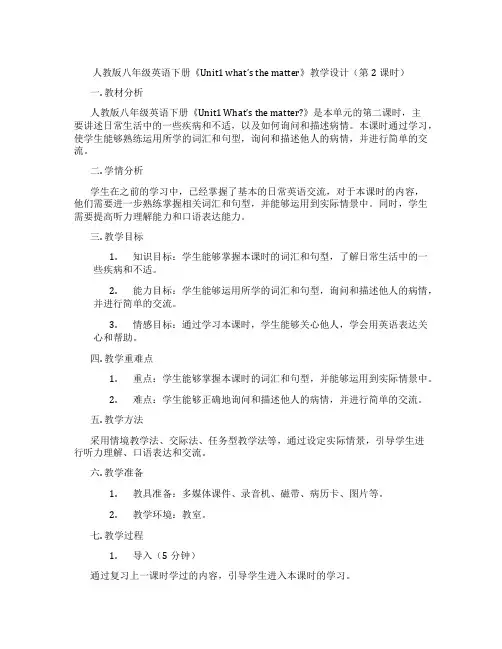
人教版八年级英语下册《Unit1 what’s the matter》教学设计(第2课时)一. 教材分析人教版八年级英语下册《Unit1 What’s the matter?》是本单元的第二课时,主要讲述日常生活中的一些疾病和不适,以及如何询问和描述病情。
本课时通过学习,使学生能够熟练运用所学的词汇和句型,询问和描述他人的病情,并进行简单的交流。
二. 学情分析学生在之前的学习中,已经掌握了基本的日常英语交流,对于本课时的内容,他们需要进一步熟练掌握相关词汇和句型,并能够运用到实际情景中。
同时,学生需要提高听力理解能力和口语表达能力。
三. 教学目标1.知识目标:学生能够掌握本课时的词汇和句型,了解日常生活中的一些疾病和不适。
2.能力目标:学生能够运用所学的词汇和句型,询问和描述他人的病情,并进行简单的交流。
3.情感目标:通过学习本课时,学生能够关心他人,学会用英语表达关心和帮助。
四. 教学重难点1.重点:学生能够掌握本课时的词汇和句型,并能够运用到实际情景中。
2.难点:学生能够正确地询问和描述他人的病情,并进行简单的交流。
五. 教学方法采用情境教学法、交际法、任务型教学法等,通过设定实际情景,引导学生进行听力理解、口语表达和交流。
六. 教学准备1.教具准备:多媒体课件、录音机、磁带、病历卡、图片等。
2.教学环境:教室。
七. 教学过程1.导入(5分钟)通过复习上一课时学过的内容,引导学生进入本课时的学习。
2.呈现(10分钟)教师通过多媒体课件,展示本课时的词汇和句型,引导学生进行学习。
3.操练(15分钟)学生两人一组,进行角色扮演,模拟日常生活中询问和描述病情的情景。
教师巡回指导,纠正发音和表达错误。
4.巩固(10分钟)学生通过听力练习,加深对词汇和句型的理解和运用。
教师及时解答学生的问题。
5.拓展(10分钟)学生分成小组,讨论如何用英语描述他人的病情,并展示给其他同学。
6.小结(5分钟)教师对本课时所学的内容进行小结,强调重点和难点。
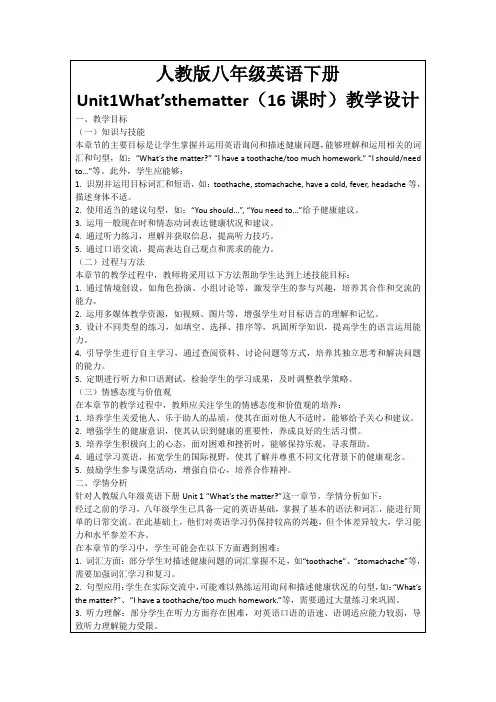
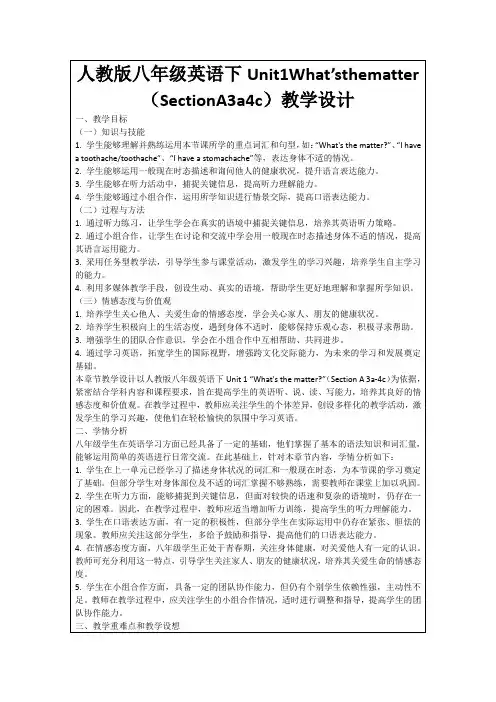
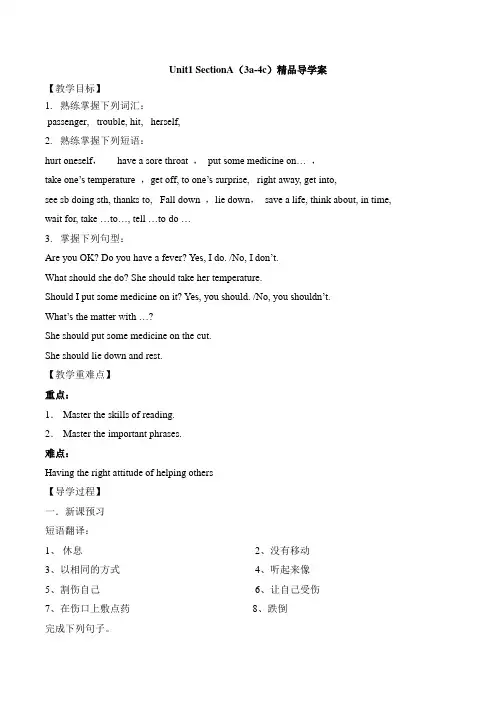
Unit1 SectionA(3a-4c)精品导学案【教学目标】1.熟练掌握下列词汇:passenger, trouble, hit, herself,2.熟练掌握下列短语:hurt oneself,have a sore throat ,put some medicine on… ,take one’s temperature ,get off, to one’s surprise, right away, get into,see sb doing sth, thanks to, Fall down ,lie down,save a life, think about, in time,wait for, take …to…, tell …to do …3.掌握下列句型:Are you OK? Do you have a fever? Yes, I do. /No, I don’t.What should she do? She should take her temperature.Should I put some medicine on it? Y es, you should. /No, you shouldn’t.What’s the matter with …?She should put some medicine on the cut.She should lie down and rest.【教学重难点】重点:1.Master the skills of reading.2.Master the important phrases.难点:Having the right attitude of helping others【导学过程】一.新课预习短语翻译:1、休息____________ __________2、没有移动_______________3、以相同的方式_________________4、听起来像_____________5、割伤自己____________________6、让自己受伤____________________7、在伤口上敷点药________________________8、跌倒__________________完成下列句子。
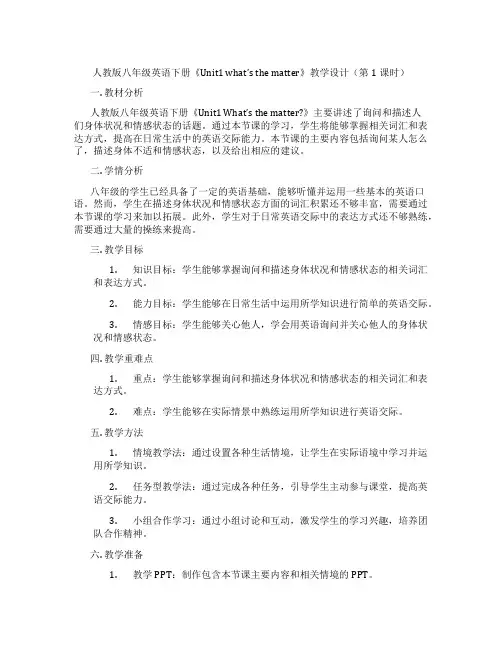
人教版八年级英语下册《Unit1 what’s the matter》教学设计(第1课时)一. 教材分析人教版八年级英语下册《Unit1 What’s the matter?》主要讲述了询问和描述人们身体状况和情感状态的话题。
通过本节课的学习,学生将能够掌握相关词汇和表达方式,提高在日常生活中的英语交际能力。
本节课的主要内容包括询问某人怎么了,描述身体不适和情感状态,以及给出相应的建议。
二. 学情分析八年级的学生已经具备了一定的英语基础,能够听懂并运用一些基本的英语口语。
然而,学生在描述身体状况和情感状态方面的词汇积累还不够丰富,需要通过本节课的学习来加以拓展。
此外,学生对于日常英语交际中的表达方式还不够熟练,需要通过大量的操练来提高。
三. 教学目标1.知识目标:学生能够掌握询问和描述身体状况和情感状态的相关词汇和表达方式。
2.能力目标:学生能够在日常生活中运用所学知识进行简单的英语交际。
3.情感目标:学生能够关心他人,学会用英语询问并关心他人的身体状况和情感状态。
四. 教学重难点1.重点:学生能够掌握询问和描述身体状况和情感状态的相关词汇和表达方式。
2.难点:学生能够在实际情景中熟练运用所学知识进行英语交际。
五. 教学方法1.情境教学法:通过设置各种生活情境,让学生在实际语境中学习并运用所学知识。
2.任务型教学法:通过完成各种任务,引导学生主动参与课堂,提高英语交际能力。
3.小组合作学习:通过小组讨论和互动,激发学生的学习兴趣,培养团队合作精神。
六. 教学准备1.教学PPT:制作包含本节课主要内容和相关情境的PPT。
2.教学素材:准备一些描述身体状况和情感状态的图片或卡片。
3.教学录音设备:用于播放听力材料。
七. 教学过程1.导入(5分钟)教师通过播放一段关于人们描述身体状况和情感状态的听力材料,引导学生关注本节课的主题。
同时,教师可以提问学生:“Can you guess what’s the matter with them?”,激发学生的学习兴趣。
Unit 1 What’s the matter? 学案Period 1 Section A (1a—2d)【学习目标】1.复习习运用一般现在时。
2.识记身体部位词组。
【学习重难点】重点: 复习运用一般现在时。
难点:1. 熟练运用句型-重点句型What’s the matter?I have a cold/ stomachache/ toothache/ fever/ headache/ backache/ sore throat.2. 学会关心自己和他人。
3. 学会用英语表达身体的不适并能听懂表达人身体不适的状况。
【自学指导】1. 自己认读1a单词,与画面中字母匹配,并在自己的身体上指认人体部位。
2. 对照单词表翻译1a画面上的句子,并读熟。
5min (5分钟)【自学检测】A.单词。
1. arm _______2. stomach _______3. throat _______ 4 . back ________5. ear _________6.eye _________7. foot(复数)_____8. hand _______9. head _______ 10. 腿_______ 11. 嘴,口______ 12. 脖子_______13. 鼻子_______ 14. 牙齿(复数)______B.短语感冒胃疼躺下太多足够的水咽喉痛【预习疑问】你在预习中遇到的问题有哪些?【合作交流】一、预习交流,检查1a 的预习效果(熟练掌握1a中的表示身体部位的词)二、合作学习1.放录音让学生完成1b,2.小组操练,完成1c.3.放录音让学生完成2a-2b三、拓展延伸完成2c讨论句型:What’s the matter ? I have a cold自读对话2d两次,把握大意,划出不懂之处并自己查字典解决。
【合作探究】1.have a cold的意思是“感冒,着凉”为固定词组,have 表示生……病,解释下列词组的意思。
Unit 1 What’s the matter?(1)【学习目标】:知识与技能:1. 能听说读写重点单词和词组:matter, sore, have a cold, stomachache, have a stomachache, foot, neck, stomach, throat, fever, lie, lie down, rest, cough, X-ray, toothache, take one’s temperature,see a dentist2.句型:学会用What’s the matter? I have a cold. I have a stomachache. I have a sore back. I have a sore throat. 谈论身体情况。
3. 学习用should 给出建议过程与方法:向学生展示图片,同时播放录音,让学生努力地听,理解大意;采用学生模仿录音读,并和老师合作对话练习,学生之间对话练习;情感态度与价值观:通过谈论身体状况给出同学相应的建议,可以使同学之间的情谊加深。
【学习重点】:能询问并表述身体的种种不适以及对他人身体的种种不适给予适当的建议。
【学习难点】:用should 给出建议,使用情态动词。
【学法指导】:“组织课堂——复习——导入新课——讲授新知识——操练巩固”来开展教学预习交流把你所知道的身体部位的单词写下来,并写出其相应的中文意思。
eye眼睛_______ ______ ______ ______ ______ ____________ ______ ______ ______ ______ ______ ______ ____________ ______ ______ ______ ______ ______ ______ ____________ ______ ______ ______ ______ ______ ______ ______【合作探究]1、What’s the matter?怎么了,其后常与介词with 连用。
八年级(下)Unit One What’s the matter? 学案(B稿)一;重点单词1._________ . n. 问题;事情_________________________ 怎么啦?v. 要紧,有重要性________________________ 没关系。
2._________ adj. 疼痛的,酸痛的have a sore + ___________have a ______ _______ 嗓子痛have a _______ _______ 后背痛3._______________________ 胃疼/头疼合成词身体部位+ _______ …疼________ n. 疼痛I have ______ ______ in the arm 胳膊疼vi. 疼;疼痛My left hand ________. 我的左手疼。
4. __________ n. 脚;足--(复数pl.)___________ 脚印;足迹__________5.__________ v. 躺;平躺-(-ing) __________ (过去式pf)________ 躺下____________说谎(pf.)____________他说谎成性,没有人信任他。
_____always _______. So nobody ______ ______ him.6.rest v.&n. 放松;休息(同____________)通常在两节课间我们会有十分钟的休息。
We always have ________________________between two classes.休息一会儿,你就会感觉好多了。
Rest for a while, you’ll feel better.7. _________ 休息n. take ________ = take a break 休息= have a rest = rest (v.)v. break 打断;打破(记录);裂;碎-- (pf.) ______________他今早打碎了一个玻璃杯He _______ a glass this morning.8._________ X 射线get __________ X-ray9._________ vi. 疼痛我今天脖子疼My neck ________today.vt. 使…受伤、使…疼痛这鞋很伤脚These shoes ___________________.伤害某人的感情___________________________伤到某人自己___________________________adj. 受伤的她看上去很受伤。
八年级下册Unit 1 What’s the matter?Section A1. What’ s the matter? 怎么啦?出什么事情了?【解析】What’ s the matter with you?= What’s the trouble with you?= What’ s wrong with you?你怎么了?= What’s up?= What happens to sb.?【2013自贡3】18. —What’s the matter ______ Tom. He is wet through.—His car ran _______ the river.A.with; inB.to; intoC.with; into—What’s the matter with you ?— I have a bad cold.( ) ①What’s ____ with you?A. troubleB. the matterC. the wrongD. matter( )②— ______?— Nothing serious , but a bit tired.—Better have a rest now, dear.A. Is that allB. Is there anything elseC. What’s thisD. What’s the matter with yo u【2011.云南昆明】27. —What’s the matter with Tina?—_______________.A. She is away.B. She is cool.C. She has a sore throat.D. She should take some medicine【拓展】matter的用法(1) It doesn’t matter没关系(用来回答别人道歉时的用语)( ) —I’m sorry to break your pen.—_______A. That’s rightB. It doesn’t matterC. Thank you【2013黑龙江齐齐哈尔】17.-I have a pain in my back.- _____ . You’d better see a doctor.A. I’m sorry to hear thatB. Nothing seriousC. It doesn’t matter【2013四川广安】26.—Sorry, I'm late again.—______.A.That’s OK B.It doesn't matter C.Good idea2. I have a cold 我感冒了I have a stomachache 我患胃痛I have a sore back. 我背痛。
【解析1】 have a/an + 疾病名词“患……病” (cold/fever/cough)have a sore throat 患喉咙痛 have a sore back 患背痛have a fever 发烧 have a cold =catch a cold 患感冒have a stomachache 患胃痛 have a toothache患牙痛have a headache 患头痛 have a backache患背痛①Mike’s sister _________________(not have) a stomachache.【2012曲靖中考】I didn’t sleep well last night, because I _____ a toothache .A. wasB. wentC. hadD. took【2013山东莱芜】—Tony, What’s ___ matter with you?— I have _____ toothache.A. a; theB. the; aC. /; theD. the; /【解析2】back n 背;背部 at the back of......在......的后面go/come back 返回 give back 归还3. hand n 手 hand in hand 手拉手V 交给;传递 hand in 上交 hand on 依次传递 hand out 分发4. She talked too much yesterday and didn’t drink enough water.她昨天说话太多了并且没有喝足够的水。
( ) He has a sore throat . He should ______.A. see a dentistB. drink hot tea with honeyC. drink a lot of milkD. eat nothing【2013达州3】15. —Which would you prefer, coffee or orange juice?— Either _________ OK, but I prefer coffee __________milk in it.A.are, withB. is, to C .is, with D. are, to【2013连云港】30. — I'd like a cup of black coffee. What about you, Maggie?— I prefer coffee ________ sugar.A. thanB. forC. withD. to⑵prep. 和......一起I like to talk freely with my friends.⑶ prep 用......,表示“使用某种工具”Cut it with a knife.6. see a dentist and get an x- ray. 看牙医并且拍张x光。
【解析1】see a dentist = go to a dentist看牙医see a doctor = go to a doctor 看医生【解析2】X-ray/'eks rei/n. X 射线;X 光【2011湖南湘西】You are ill. You had better ___ the doctor right now.A. look atB. seeC. watch【2012四川成都】33. —Where did you go yesterday, Rick?—I went to see a ______ because I had a cold.A. teacherB. doctorC. reporter7. What should she do?她该怎么办呢?Should I take my temperature?我应该量一下体温吗?【解析1】should ―应该‖情态动词,后跟动词原形,表示责任和义务should not =shouldn’t不应该主语+ should/ shouldn’t +动词原形. ..①You should lie down and rest. 你应该躺下休息一会儿。
②You shouldn’t’ t go out at night.你晚上不应该出去。
( ) ② You ____ be quiet when you are in the reading room.A. shouldB. shouldn’tC. canD. can’t【2013山西】21. A country has dreams. We teenagers ________ also have dreams. With dreams and hard work, anything amazing can be created.A. mayB. mustC. should【2013安徽】You _____ drive your car so fast. It’s very dangerous.A. wouldn’tB. shouldn’tC. couldn’tD. mightn’t【解析2】take one’s temperature量体温8. No, it doesn’t sound like you have a fever. 不需要,听起来你不像发烧了。
【解析1】sound like 听起来像,后接名词或名词性短语作表语。
It sounds like a good idea.【拓展】“感官动词+ likefeel like 摸起来像 smell like 闻起来像 look like 看起来像taste like 尝起来像【解析2】fever/ 'fi:v?:(r)/n.发烧 have a fever 发烧You need to take breaks away from the computer.你需要休息一下,远离电脑。
9. You need to take break away from the computer.你需要远离电脑,休息休息。
【解析】need v 需要◆用于肯定句是实义动词(1) need sth 需要某物 I need your help.(2) 人做主语,sb need to do sth 某人需要做某事Do you need to drink more water?(3) 物做主语,sth need doing sth = sth need to be doneMy TV set needs repairing.①I need __________(come) to the office quicklybecause some work need ___________(finish) at once.( ) ②David needs ______ a good rest. A. has B. to have C. have D. having◆用于否定句是情态动词needn’t = don’t have to没有必要must ,need 引导的疑问句肯定回答用( ) ①— Must I hand in my exercise book now, Mr. Zhao?— No, you ______ .You may give it to me tomorrow.A. needn’tB. mustn’tC. can’tD. may not( ) ②You do n’t have to go to bed too late at night.A. can’tB. shouldn’tC. needn’tD. would like to【2013广东广州】20.—Must I finish my homework now?—No, you ______. You can go home now.A. needn’tB. mustn’tC. shouldn’tD. can’t9. I think I sat in the same way for too long without moving.我想我以同样的姿势一动不动地坐得太久了。